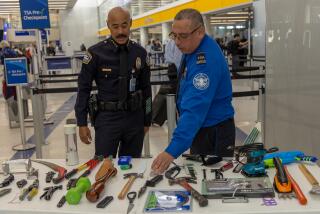U.S. and South Korea complete trade deal
The United States and South Korea on Friday completed a long-sought trade deal that could help boost the struggling U.S. economy by further opening one of Asia’s top markets to American companies.
The key to the pact, which eluded President Obama when he visited South Korea last month, was working out disagreements on access to both markets by automakers. The agreement has long been supported by other business sectors, including the entertainment industry.
The agreement pumps up intellectual property protection, and it prevents South Korea from increasing most of its current content restrictions for film and TV programming. For example, under the new provisions, Korea will not be able to increase the number of days that the country’s theaters will be required to show Korean films.
There are also provisions that increase U.S. investment opportunities in the Korean cable TV and digital media businesses.
“This agreement is a victory for the U.S. motion picture and television industry and the creative men and women whose livelihoods depend on it, and we support its prompt ratification,” said Bob Pisano, interim head of the Motion Picture Assn. of America.
A senior Obama administration official, who was not authorized to speak publicly, said that where American workers were concerned, the deal improved “dramatically” upon what the South Koreans were open to last month.
A major roadblock was that the Obama administration wanted more time to phase out U.S. tariffs on South Korean imports than the Bush administration had agreed to when a deal was first struck in 2007.
Resolving that dispute paves the way for the wide-ranging agreement to be sent to Congress, where there appears to be enough support to approve it.
In regard to the automobile industry, the U.S. would keep a 2.5% tariff on imported South Korean cars in place until the fifth year of the deal, instead of phasing it out by the third year. In exchange, South Korea immediately would cut its 8% tariff on imported U.S. cars to 4% and then fully eliminate it in the fifth year. The 2007 deal called for the 8% tariff to be eliminated immediately.
The new agreement also gives the U.S. better terms on tariffs on trucks.
The Obama administration touted the revised deal as providing greater access to South Korea for other U.S. industries, including agriculture, financial services, aerospace and telecommunications. For example, South Korea would eliminate its 40% tariff on U.S. beef, dropping the price by $1,300 per ton and saving U.S. exporters $90 million a year.
In total, the deal would eliminate South Korean tariffs on 95% of U.S. industrial and consumer goods within five years.
The U.S. Chamber of Commerce on Friday called for Congress to quickly approve the pact to help boost the economy.
“This agreement will create thousands of new jobs, advance our national goal of doubling exports in five years, and demonstrate that America is once again ready to lead on trade,” chamber President Thomas J. Donohue said. “We will do everything in our power to round up the votes.”
The deal was struck after four days of around-the-clock talks this week in Columbia, Md., between U.S. Trade Representative Ron Kirk and his South Korean counterpart, Kim Jong-hoon. Then Kirk, along with Michael Froman — the deputy national security advisor for international economic affairs — and other administration officials began calling members of Congress, who must ratify the pact.
White House staffers said the deal got a warm reception. Republicans in particular have pressed for completion of the South Korea trade pact to boost U.S. exports.
The U.S. International Trade Commission has estimated that the deal, under earlier terms, would increase the total annual economic output of the U.S. by $10.1 billion to $11.9 billion once fully implemented. That would result in an increase of 0.1% in the U.S. gross domestic product, which the Congressional Research Service said in a report last month would be “a negligible amount given the size of the U.S. economy.”
But even a small boost could be important amid the tepid economic recovery. The U.S. economy grew at annualized rate of 2.5% in the third quarter of this year and a disappointing jobs report Friday showed that the unemployment rate jumped to 9.8% in November.
The Bush administration negotiated the 2007 trade deal with South Korea, but political changes in both countries have stalled the necessary approval by lawmakers. Obama has tried to deal with pressure from U.S. automakers to make the terms more favorable to Detroit, and South Korean President Lee Myung-bak has faced pressure not to allow more U.S. beef imports. When he announced an agreement in 2008 to lift a partial ban on U.S. beef imports amid the scare over mad cow disease, the move sparked huge protests.
More to Read
Start your day right
Sign up for Essential California for news, features and recommendations from the L.A. Times and beyond in your inbox six days a week.
You may occasionally receive promotional content from the Los Angeles Times.








